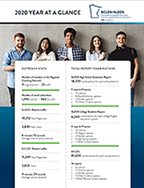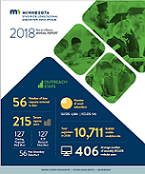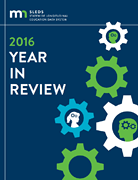Minnesota P-20 Statewide Longitudinal Education Data System
Minnesota developed the Minnesota Statewide Longitudinal Education Data System (SLEDS) matching student data from pre-kindergarten through completion of postsecondary education and into the workforce. Bridging existing data with other incoming data a range of education programmatic and delivery questions can be answered to gauge the effectiveness of current programs and design targeted improvement strategies to help students.
SLEDS brings together data from education and workforce to
- Identify the most viable pathways for individuals in achieving successful outcomes in education and work;
- Inform decisions to support and improve education and workforce policy and practice, and
- Assist in creating a more seamless education and workforce system for all Minnesotans.
The Minnesota P-20 Education Partnership governs the SLEDS system. The project is managed jointly by the Minnesota Office of Higher Education (OHE), Minnesota Departments of Education (MDE), and Employment and Economic Development (DEED).
Recently Released Reports
Indiana and Minnesota Students Who Focused on Career and Technical Education in High School: Who Are They, and What Are Their College and Employment Outcomes?
SLEDS data was used in a recent Regional Education Laboratory Midwest report on career and technical education in high school. Minnesota and Indiana partnered with REL Midwest to examine whether high school graduates in each state who completed a large number of career and technical education courses in a single career-oriented program of study had different college and workforce outcomes from graduates who completed fewer or no career and technical education courses. The report can be found at: https://ies.ed.gov/ncee/edlabs/projects/project.asp?projectID=4655
Pathways to College and Career for Students Identifying as Deaf, Hard of Hearing, or Deaf/Blind Report
Check out the new report on Minnesota deaf and hard of hearing students. The study finds that Deaf, Deaf/Blind, and Hard of Hearing students in Minnesota are only slightly less likely to finish high school than their hearing peers in Minnesota. Additionally, 68% enrolled in a postsecondary institution which was less than that of all Minnesota students (81%) but higher than the national average in 2019 of 66% (U.S. Bureau of Labor Statistics, 2020). 59% of Deaf, Deaf/Blind, and Hard of Hearing students in Minnesota were employed post-high school exit, which is larger than the national average of 53% for the Deaf, Deaf/Blind, and Hard of Hearing community but smaller than the average for all residents in Minnesota of 68%.
Pathways to College and Career for Students Identifying as Deaf, Hard of Hearing, or Deaf/Blind
PDF of Presentation
Report
The SLEDS and ECLDS Annual Report describes the mission, achievements, purpose, and future of SLEDS and ECLDS. In reflecting on the efforts that brought SLEDS and ECLDS to its current status, we can look forward to the work in the years to come that will build a sustainable data system. As Minnesota faces new and unknown challenges in education and the workforce, we need diverse stakeholder groups to engage with the tools available to identify potential for system improvement and more strategic public investments. SLEDS and ECLDS is only the instrument to answer critical social questions.
|
|
|
|
Postsecondary Data Mart Access
The Postsecondary Data Mart is a secure website where a postsecondary institution can download student-level data for enrolled and graduating students from SLEDS, including pre- and post-college variables. For more information about the data available for download, see the attached the Postsecondary Data Mart Field List for Enrolled Students/Completers.
The steps for accessing the Postsecondary Data Mart will vary based on the institution. These processes are detailed below. OHE will also host two webinars to provide further details about the Postsecondary Data Mart and the access process.
Access & Approval Process
In order to ensure security of SLEDS data, you and your institution must complete several steps to gain access.
Access Roles
The OHE Data Sharing Agreement Clause 2 Representative (C2R) is the individual authorized to grant OHE permission to release information identifying the institution or system. This is also the individual responsible for signing the SLEDS DSA. Contact SLEDS.Support@state.mn.us if you'd like to know who your Clause 2 Representative is.
A Level 3 User is an individual approved by the University of Minnesota or Minnesota State Colleges and Universities system office to be able to access SLEDS data on students from their institution, but is not responsible for granting release of information.
Access Forms
- All private institutions will need their Clause 2 Representative to sign the SLEDS Data Sharing Agreement.
- To update your OHE Data Sharing Agreement Clause 2 Representative, submit the Update to Clause 2 Representation Amendment.
- University of Minnesota staff seeking access to ECLDS should complete the SLEDS Level 3 Postsecondary Data Mart Form for University of Minnesota staff.
- Minnesota State Colleges and Universities staff seeking access to SLEDS should complete the SLEDS Level 3 Postsecondary Data Mart Form for Minnesota State staff.
Access Links
Resources for Colleges
- Updates to SLEDS Post-Secondary Secure Reports AIRUM 2018
- SLEDS 101 for Colleges AIRUM 2017
- Utilizing SLEDS Data for Your Institution AIRUM 2016
- SLEDS Research and Reports
Contact:
Nora Morris, Office of Higher Education, 651-259-3983
Please Note:
- Accessing the Microsoft Excel file(s) on this page may require you to
download the free Excel Viewer from Microsoft - Accessing the Microsoft Word file(s) on this page may require you to
download the free Word Viewer from Microsoft
More Information
Related Pages
Related Links
- Minnesota Department of Education
- Minnesota Department of Employment and Economic Development
- Data Quality Campaign
- Statewide Longitudinal Data Systems grant program. U.S. Department of Education
- Graduate Employment Outcomes Tool
Note: documents in Portable Document Format (PDF) require Adobe Acrobat Reader 5.0 or higher to view.
Quick Links
- Why College?
- Explore Your Interests & Careers
- Prepare at School
- Summer Academic Enrichment Program
- The Many Ways to Earn Credit for College
- Recommended High School Classes & Graduation Requirements
- Advice for Students with Disabilities
- Succeed as an Adult Student
- Useful College Prep Resources
- Minnesota Goes to College!
- Collecting Data from Minnesota Postsecondary Institutions
- Campus Financial Aid Administrator Resources
- Campus Student Enrollment Reporting Resources
- Ordering Materials for Your Students
- Supplementing Your College Counseling
- Early Awareness Efforts
- Student Homelessness in Higher Education Resources
- Shared Library Resources
- MN FAFSA Tracker
- Campus Sexual Violence Prevention and Response
- Statewide FAFSA Filing Goal
- MyHigherEd
- Online Applications
- About Financial Aid
- What Does College Cost?
- Tips for Lowering the Cost of Higher Education
- Institutional Payments
- Financial Aid You Don't Repay
- Financial Aid You Must Repay (Student Loans)
- Financial Aid You Earn
- Military Service Education Benefits
- Reduced Out-of-State Tuition Options
- Education Tax Benefits
- Public Service Loan Forgiveness
- Ready, Set, FAFSA!
- North Star Promise
- Minnesota Paramedic Scholarship
- Data Maps and Infographics
- Educational Attainment Goal 2025
- Minnesota P-20 Statewide Longitudinal Education Data System
- Minnesota Measures
- Student Enrollment Data
- College Readiness & Participation Data
- Degrees, Graduation Rates, Attainment & Outcomes
- Tuition & Fees Data
- Student Health and Safety
- Financial Aid Data & Trends
- Institution and Data Search
- Transfer Students
- Research Reports
- A-Z Data Table Index
- Postsecondary Funding
- Special Student Populations



